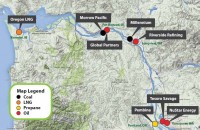By Miles Johnson, Clean Water Attorney

The Columbia River is threatened with unprecedented fossil fuel export terminals. Coal, oil, and propane companies would send dirty products by train through the Gorge, to be transferred to large ocean-going vessels at terminals in the Estuary. A liquefied natural gas (“LNG”) terminal would receive fracked gas via a large new pipeline. We must choose clean and renewable energy now: building fossil fuel infrastructure today locks in dirty energy production and consumption for decades.
COAL
Millennium Bulk Terminals – Coal, Longview, WA
Capacity: 44 million tons/year, 62 trains/week.
Fact: Millennium would place huge, uncovered coal piles on the banks of the Columbia.
Status: State and federal agencies plan to finish the Environmental Impact Statement (EIS) for this massive coal export facility in late 2015.
Morrow Pacific – Coal, Port of Morrow and Port Westward, OR
Capacity: 8 million tons/year, 11 trains/week.
Fact: Cash-strapped Ambre Energy (the original backer of this coal export project) has folded and sold to a Denver-based private equity company.
Status: Oregon denied the coal dock permit in August 2014 due to unacceptable impacts to the Columbia River. Ambre’s appeal is pending.
OIL
Waterside Energy – Oil Refinery and Propane Export Terminal, Longview, WA
Capacity: 30,000 barrels/day oil, 3 trains/week.
Fact: Waterside proposed the first west coast oil refinery in 25 years and the first ever on the Columbia River.
Status: Feb. 23, 2016, Port of Longview commissioners voted unanimously to end negotiations with Waterside Energy.
Tesoro Savage – Oil-by-Rail Terminal, Vancouver, WA
Capacity: 360,000 barrels/day, 36 trains/week.
Fact: Largest proposed oil-by-rail facility in North America, 42% of the capacity of Keystone XL pipeline.
Status: Washington will prepare draft EIS in 2015; Riverkeeper challenged the Port of Vancouver’s decision to lease public land for oil terminal.
NuStar Energy – Oil-by-Rail, Vancouver, WA
Capacity: 22,000 barrels/day, 2 trains/week.
Fact: NuStar submitted its application hours before Vancouver passed a moratorium on oil-by-rail.
Status: Vancouver decided that NuStar’s project requires a thorough EIS to describe the safety and environmental risks. NuStar sued Vancouver to prevent the EIS.
Global Partners – Oil-by-Rail, Port Westward, OR
Capacity: 120,000 barrels/day, 12 trains/week.
Fact: Global Partners began shipping oil in 2012 from a biofuel refinery, and plans a large expansion.
Status: Riverkeeper and the Confederated Tribes of the Umatilla Indian Reservation are asking the federal government to evaluate the risk of a crude oil spill in the Columbia River Estuary.
NATURAL GAS
Oregon LNG – Liquefied Natural Gas, Warrenton, OR
Capacity: 1.3 billion cubic feet/day of fracked gas via pipeline.
Fact: Exporting gas to Asia would increase fracking and energy prices in North America.
Status: The Federal Energy Regulatory Commission issued a draft EIS, despite the Clatsop County Commissioners unanimous vote rejecting the LNG pipeline.
PROPANE/LIQUEFIED PETROLEUM GAS
Washington Energy Storage & Transfer (WEST) – LPG Export Terminal, Longview, WA
Capacity: One unit train of LPG per day (72,500 barrels per train). The propane would be “loaded onto very large gas carriers for export to international customers.”
Fact: The Port of Longview recently rejected a similar LPG export proposal by Haven Energy.
Fact: Massive LPG tankers require security zones up to 500 yards and could interfere with recreational and commercial river traffic.
Status: WEST needs approval from the Port of Longview and permits from Washington.
Pembina – Propane-by-Rail, Portland, OR
Capacity: 72,000 barrels/day, 7 trains/week.
Fact: Mile-long unit trains of dangerous propane would traverse Portland daily.
Status: Portland Mayor Hales asked Pembina to drop its plans, but Pembina is pushing forward.
Riverkeeper is challenging plans to turn the Columbia into a fossil fuel highway, and we are winning! Take a stand for clean water today by support legal work and community organizing.
Notes: Information up-to-date as of September 3, 2015. Check out our website for details fact sheets. “Trains/week” means full trains. Oil train numbers based on 70,000 barrels per train. Capacity means the volume stated by the companies. Many facilities expand once permitted. Trains serving Puget Sound and California facilities also travel down the Columbia River, but are not counted here.


